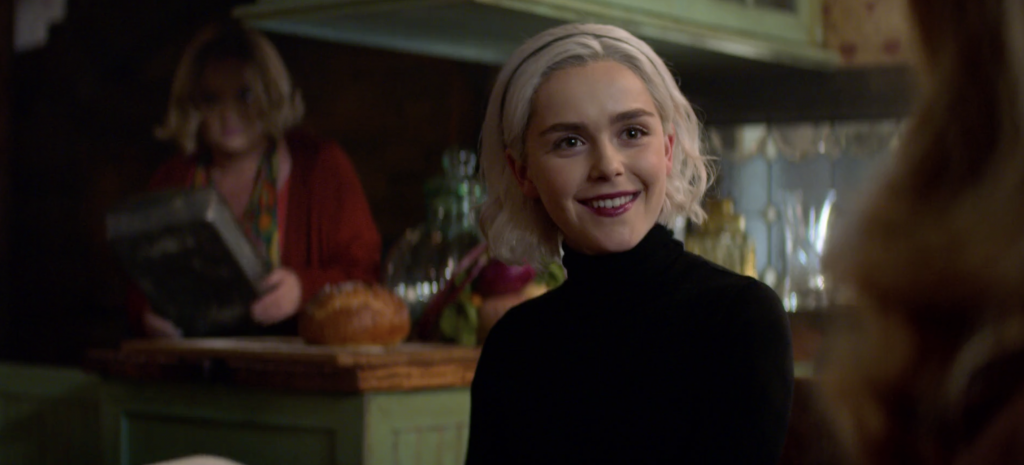The new take on Sabrina the Teenage Witch, based on a recent comic book, does away with the hokey 90s tone and doubles down on darkness, gruesomeness and witch lore.
The ten-episode first season is an experiment that works more often than not, but it’s not without its flaws. The series, produced by Roberto Aguirre-Sacasa, is a spin-off of CW’s Riverdale. The Chilling Adventures of Sabrina, however, is more mature and complex than its CW counterpart, although perhaps not as entertaining in terms of over-the-top drama. With the second season being released on Netflix today, we re-examined what worked (and didn’t work) in the first ten episodes.
Choosing Between Two Worlds
The story begins with Sabrina Spellman facing a difficult decision on the eve of her sixteenth birthday. She has to undergo an occult ritual called the Dark Baptism and pledge allegiance to the Dark Lord (who is, literally, Satan), following in the footsteps of her illustrious father, who was a dark priest of the Church of Night.
Sabrina, portrayed by Kiernan Shipka (who last portrayed Sally Draper in Mad Men) is full of piss and vinegar and chooses to walk her own path, earning the ire and attention of powerful magical forces.
The series also explores the connections between feminine mystique and witchcraft. Sabrina also fights for equal rights in both the magic and mortal worlds, opening a women’s rights club called WICCA at her school and speaking out against traditional hazing practices in the magical schooling community.
Spunk and Female Power
Like Riverdale, the Chilling Adventures of Sabrina takes place in an anachronistic setting that blends sixties’ aesthetics with modern technology. The series tackles modern identity politics issues such as intersectionality and equality, featuring characters that are non-binary and pansexual.
The series’ dark nature does sometimes clash with the cartoonish invocations used by the witches and warlocks, but the visual imagery makes up for it, for the most part. However, the show doesn’t balance the mortal elements of Sabrina’s life as well as the magic, and her supporting cast suffers for it. Her relationship with her boyfriend, Harvey Krinkle (Ross Lynch), is a tad saccharine, but perhaps that will develop into something more unique in future seasons.
Sabrina’s family, however, stands out. Both Aunts Hilda and Zelda are breaths of fresh air, and the contrast between the two forms the foundation for a lot of the show’s humor. Sabrina’s cousin, Ambrose, steals most scenes he is in.
Another principle cast member, Ms. Wardwell (played by Doctor Who alumnus Michelle Gomez) is a standout, deftly manipulating several characters with her words and quiet menace.
In addition to the main narrative that explores Sabrina’s destiny as she comes of age, the show is fundamentally about standing up against oppression and the patriarchy. She questions why she must give up her freedom to gain power from Satan, to which she gets the reply “Because he’s a man, isn’t he?”.
Of course, in her crusades, Sabrina risks losing her own identity, almost becoming an arrogant bully as she tries to fight fire with fire. The way the series progresses, the first season feels largely like a prequel, introducing the characters and setting up in interesting situations.
Not Without its Flaws
The show, however, doesn’t always flesh out its characters, and it suffers for that choice. Sabrina sometimes feels more like a construct rather than a living, breathing character, and although Shipka has a lot of earnest screen presence, she doesn’t get much meat to chew on in terms of nuance and complexity. The show also struggles to balance its legacy of campiness and current dark tone.
Nevertheless, the series takes a step in the right direction, and if you consider the show as a teen drama, it’s quite well made even in comparison to Riverdale. The second season starts off strong as well, with Sabrina embracing her dark side more as she vies for the Top Boy position in her witchcraft school. Although she is speaking out with the same kind of vinegar and impassioned fire as before, there’s a touch of greed and selfishness to her actions that everyone around her is starting to notice.
This is a good parallel to how many attempt to co-opt feminist movements- or really, any social movement for that matter- for their own personal gains. Will Sabrina turn out to be a ‘bad feminist’? That yet remains to be seen. The story, thankfully, remains as crisp and smoothly-paced as ever. We will let you know how the second season works overall, once we are done binging it through the next few days.
